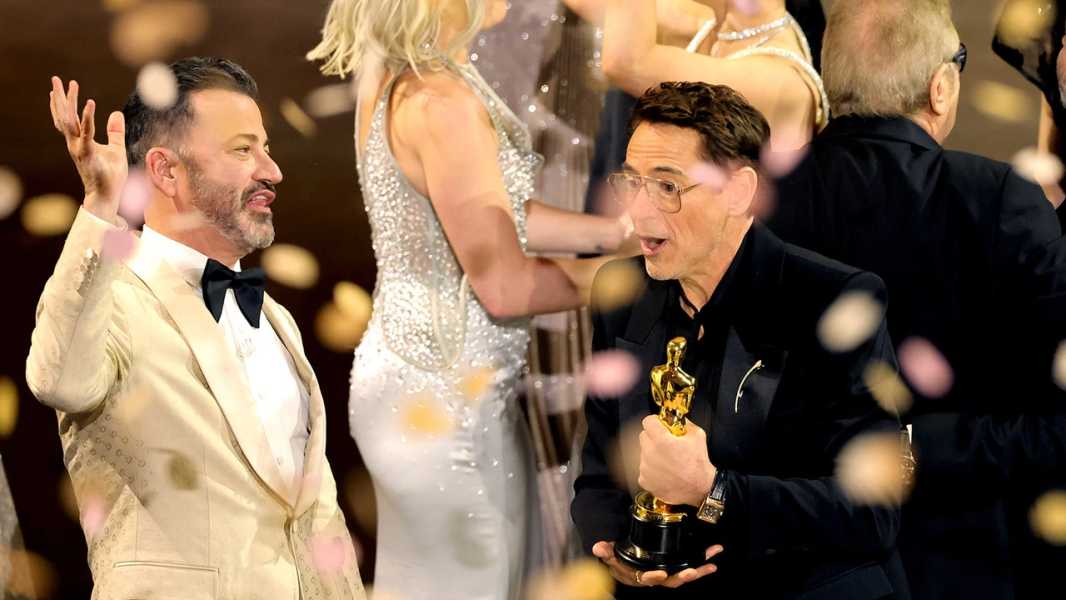
Save this storySave this storySave this storySave this story
The reasons for the success of “Oppenheimer” at the Oscars—thirteen nominations and seven wins—are self-evident. The movie is about a serious historical and political subject, and it made a zillion dollars. It embodies the venerable formula of doing well while doing good. It’s safe to say that many people who work in movies would rather work on pictures that seem substantial than on ones that seem frivolous and commercial. Whatever the artistic shortcomings of “Oppenheimer,” the importance of its subject is undeniable, and so is Christopher Nolan’s ambition to make a movie that is worthy of that importance. But let’s be clear: if “Oppenheimer” had flopped, or just broken even, it would likely have had the same presence at this year’s ceremony as Martin Scorsese’s “Killers of the Flower Moon”—ten respectful nominations, zero wins.
And what of the winner’s prime commercial rival, “Barbie”? Forever paired with “Oppenheimer” in the public mind because of the happenstance of a shared release date, comparably extraordinary box-office fortunes, and the snappy portmanteau “Barbenheimer,” the exuberant “Barbie” has had a very different awards season from that enjoyed by Nolan’s self-consciously serious opus. The Oscars are almost always hard on comedies and “Barbie” suffers additionally from a fear of what its profitability and acclaim augur. Movie people who thrill to the idea that, after “Oppenheimer,” studios will be flinging nine-figure budgets at movies with similarly weighty subjects are doubtless terrified that “Barbie” won’t be the last film adapted from a toy maker’s product line. Great as “Barbie” is, it’s all too easy to imagine that it could usher in an era of formulaic filmmaking akin to that of the superhero era—that Mattel and its competitors may codify not the successful production process of “Barbie” (hiring a boldly original director and granting her an unusual degree of artistic freedom) but the successful results, bringing on lesser filmmakers and constraining them to make something “Barbie”-ish.
Nonetheless, Hollywood, laboring long within the limits of franchise filmmaking, must indeed be feeling a bit of swagger at having made two such idiosyncratic movies and made money from them. This year’s ceremony, hosted by Jimmy Kimmel, reflected those good feelings, which were alluded to in his opening monologue. It was a pretty chipper night all around, for better and for worse. Kimmel got in a couple of political zingers of a surprising and welcome acerbity, likening the protagonist of “Poor Things,” “an adult woman with the brain of a child,” to Senator Katie Britt, the Republican who delivered the animatronic response to the recent State of the Union address, and asking Donald Trump, who inveighed against Kimmel’s host performance on social media while the broadcast was running, “Isn’t it past your jail time?” Kimmel also added an apt jab at Tinseltown mores. Noting that the nominees Jodie Foster and Robert De Niro were also nominees together, nearly fifty years ago, for “Taxi Driver,” he said that, back then, she was of an age to play his daughter, whereas now “she’s twenty years too old to be his girlfriend.”
Beyond the wisecracks, it was stirring to hear Kimmel speak with pride about the solidarity of the writers’ and actors’ unions during last year’s strikes and to watch him welcome onstage a large crowd of members of other Hollywood labor unions as they approach the crisis point of their own negotiations with the studios. Still, the general tone was self-congratulatory, and spilled over into the main order of business, the bestowing of awards. The announcements for the four acting categories featured not clips of the nominated performances, twenty in all, but accolades from previous winners in the categories. In place of glimpses of the actors’ artistry came displays of sickly-sweet scripted emotion. Each of the twenty noteworthy presenters (a group that included Regina King, Ke Huy Quan, Sally Field, and Matthew McConaughey) addressed one nominee directly, with praise so fulsome and sentimental that the statuettes themselves turned rose gold.
The air of hubris also permeated a part of the evening that should properly be a rite of sombre humility, the “In Memoriam” tribute video. This year, it was divided into, in effect, an A-list (those whose image got a moment onscreen to itself), a B-list (onscreen in a group, in an array of five thin vertical images), and a C-list (a bunch of names with no images, seemingly several dozen of them fading in and out onscreen). Only a tiny A-plus class of the departed were briefly seen in actual performance. This crude and insulting decision is starkly reminiscent of the high-handed Hollywood of the studio era. Speaking of omission, the evening’s oddest one appears to have been accidental: Al Pacino, presenting the award for Best Picture, failed to announce the ten films in the running for the award, instead going straight from his brief introductory spiel to the envelope, with its call for “Oppenheimer.”
As usual, very little of the comedy written for the host and the presenters rose above the level of forced amiability. One smiled for the collective desire to please rather than for actual pleasure. Still, there was one bit of staged comedy that proved effervescently authentic: John Cena, presenting the award for Best Costume, had good fun reprising the role of the streaker who interrupted the Oscars fifty years ago, and using the winner’s envelope as a fig leaf. The best moments of presenter banter involved interactions with the assembled crowd, as when Kate McKinnon did a comic bit wondering whom she’d accidentally been sending her “tasteful nudes” to and Steven Spielberg, in the audience, theatrically pointed to himself. It’s a reminder that the Oscars telecast, stagey as it may be, is a gathering of big personalities overflowing with wit, talent, and playfulness. (Think of Michael Keaton’s fierce comedic stone face in response to Arnold Schwarzenegger and Danny DeVito’s jokey gibes.) The more the Oscars can diminish formality and blur the line between the talent in the audience and the talent onstage, the livelier and the more authentically entertaining the action will be.
But what matters about the Oscars isn’t the show, which is merely a delivery system for the awards. The prizes, of course, don’t ultimately determine a film’s place in cinematic history, but they have real consequences for the careers of the people who win them—and thus for the future of the art form. In this regard, the Academy proved shortsighted this year, particularly by giving the award for Actress in a Leading Role to Emma Stone, for “Poor Things.” It’s an impressive performance, centered as it is on the conceit of a woman who’s been given an unborn fetus’s brain by a mad scientist and who must therefore master all adult skills, including language, from scratch, and fast. Stone delivers the character’s broken, developing, and always off-kilter speech with persuasively committed deftness; though the performance is impressive, it’s not her fault that it proves no more emotionally substantial than the movie does over all.
The actress who deserved to win is Lily Gladstone, for her work in “Killers of the Flower Moon,” which is different in kind from the other performances of the year and, for that matter, from most movie acting anywhere. It’s a role of quiet—sometimes even of silent—authority, and her climactic scene, with Leonardo DiCaprio, is one of the most powerful moments of performance I’ve seen in quite a while. But the character is, by design, relatively impassive, stoic, and shy of expression, albeit bursting with thought and emotion. The Academy missed the point, and not, I think, by accident: though Stone is a charismatic actor, her achievement in “Poor Things” is one of effort, of what an actor can control through sheer exertion. This makes it the kind of performance that the Academy can’t resist. By contrast, Gladstone’s performance, though no less accomplished, depends more on inner qualities and the ability to convey thought and feeling by sheer presence. This is not something that can be readily taught, learned, or mastered. The ingrained sublimity of Gladstone’s performance must secretly terrify actors, by setting a standard that none can be confident of meeting.
The Oscars were hard on the year’s best movies. “Killers of the Flower Moon,” with ten nominations, won nothing at all, and “Barbie,” which garnered eight nominations, won only for Original Song. Two of its songs were nominated; the winner was “What Was I Made For?,” by Billie Eilish and Finneas O’Connell, but the other one, “I’m Just Ken” (by Mark Ronson and Andrew Wyatt) was put over, onstage, by Ryan Gosling with an exuberance that brought the audience of luminaries and their significant others to a peak of spontaneous enthusiasm. It showed the Academy’s reliance, during the show, on the very comedic ingenuity, emotional authenticity, and giddy artifice that it refused to acknowledge in its awards. Oscar is more Barbie than he will admit. Still, at least one exquisitely inventive comedy came away with its prize tonight: “The Wonderful Story of Henry Sugar,” one of Wes Anderson’s new adaptations of tales by Roald Dahl, which won for Live Action Short Film. It’s Anderson’s first Oscar, and there’s an irony in his winning for a short in a year when he also delivered one of his most ambitious and accomplished features yet, “Asteroid City,” which received no nominations whatsoever. The only upside to the Academy’s indifference is that Anderson didn’t have to waste time on an awards campaign. He wasn’t in the theatre, as he starts shooting his next feature, “The Phoenician Scheme,” today—bigger news than any that came from the Dolby Theatre last night. ♦
Sourse: newyorker.com






